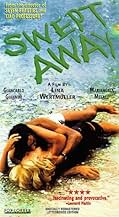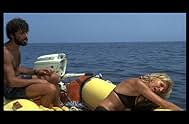Por um Destino Insólito
Título original: Travolti da un insolito destino nell'azzurro mare d'agosto
AVALIAÇÃO DA IMDb
7,5/10
7,2 mil
SUA AVALIAÇÃO
Adicionar um enredo no seu idiomaA trip into the Mediterranean sea becomes a trip into the discovery of how society's frameworks of the rich and poor are delicate and temporary.A trip into the Mediterranean sea becomes a trip into the discovery of how society's frameworks of the rich and poor are delicate and temporary.A trip into the Mediterranean sea becomes a trip into the discovery of how society's frameworks of the rich and poor are delicate and temporary.
- Direção
- Roteirista
- Artistas
- Prêmios
- 4 vitórias e 4 indicações no total
Avaliações em destaque
Despite the shrewish bitching of Rafaella and the grumbling of the sailor help- this is a very thought-provoking movie. What especially helps is the cinematography- by Wertmuller's husband- the white sailor uniform, the black diaphanous garb of R. and the blue sea as backdrop. As the affair progressed from hate to a passionate love the changes in body language is well done. Though I saw this movie many years ago- its power to address class wars, the battle between men and women and in inevitable conclusion has never left me.
Sometimes, there is nothing better than just a simple tale, easy to follow, with breathtaking scenery. Wonderfully acted story that draws you in. Giancarlo Giannini is THE best Italian actor of his time. And as a bonus, with the explicit subtitles, you can learn how to curse in Italian! While the abusive male behaviour is not terribly pc these days, it reflects the culture of some European countries. All in all shows why foreign films are so different from American films. Viva la difference!
Back in the 1970's Lina Wertmuller was an art-house superstar. But more importantly, she was a first class original, bursting with a fresh, exciting vision.
Now, here's a lively storyline: a rich, racist, reactionary female- a right wing, fascist mind in a knuckle-biting, voluptuous body -is stranded on a mid-sea desert isle with a poverty-stricken, chauvinistic, Communist male- a left-leaning propagandist in a scrawny masculine body. "Make nice" they don't. Well, not right off the bat. Not before much nasty invective and grievous bodily assault take place. But then afterward....ahh, afterward.
SWEPT AWAY, though a foreign film, is in the manic, irreverent, well-timed tradition of Hollywood screwball comedies like THE AWFUL TRUTH(1937), MIDNIGHT(1939), THE LADY EVE(1941), and most emphatically, HIS GIRL FRIDAY(1940)- only with a shipload more profane repartee, orgiastic lust, and bone-crunching physicality than was ever permissible or desirable in those older classics. Throwing all vestiges of caution to the four winds, Wertmuller really surprises the viewer with her take on the battle of the genders strained through a volcanic political dialectic.
Upon its initial release many in the audience demurred strongly (and still do) as the male's dominance slipped into outright brutality. Certainly, Wertmuller can be accused of going too far, but never of boring us. Giancarlo Giannini and Mariangelo Melato are absolutely letter perfect: sulking, teasing, attacking, retreating, seducing, rampaging, abandoning. Their director spurs them through an emotional and physical gauntlet and they meet each dramatic challenge with winning artistry. You may feel wrung out by film's end. Or enraged. Or both. But you'll have quite a time.
Now, here's a lively storyline: a rich, racist, reactionary female- a right wing, fascist mind in a knuckle-biting, voluptuous body -is stranded on a mid-sea desert isle with a poverty-stricken, chauvinistic, Communist male- a left-leaning propagandist in a scrawny masculine body. "Make nice" they don't. Well, not right off the bat. Not before much nasty invective and grievous bodily assault take place. But then afterward....ahh, afterward.
SWEPT AWAY, though a foreign film, is in the manic, irreverent, well-timed tradition of Hollywood screwball comedies like THE AWFUL TRUTH(1937), MIDNIGHT(1939), THE LADY EVE(1941), and most emphatically, HIS GIRL FRIDAY(1940)- only with a shipload more profane repartee, orgiastic lust, and bone-crunching physicality than was ever permissible or desirable in those older classics. Throwing all vestiges of caution to the four winds, Wertmuller really surprises the viewer with her take on the battle of the genders strained through a volcanic political dialectic.
Upon its initial release many in the audience demurred strongly (and still do) as the male's dominance slipped into outright brutality. Certainly, Wertmuller can be accused of going too far, but never of boring us. Giancarlo Giannini and Mariangelo Melato are absolutely letter perfect: sulking, teasing, attacking, retreating, seducing, rampaging, abandoning. Their director spurs them through an emotional and physical gauntlet and they meet each dramatic challenge with winning artistry. You may feel wrung out by film's end. Or enraged. Or both. But you'll have quite a time.
A trip into the Mediterranean sea becomes a trip into the discovery of how society's frameworks of the rich and poor are delicate and temporary.
In his review in the Chicago Sun-Times, American film critic Roger Ebert gave the film four stars, his highest rating. Ebert wrote that the film "resists the director's most determined attempts to make it a fable about the bourgeoisie and the proletariat, and persists in being about a man and a woman. On that level, it's a great success." I'm on board with Ebert. I think this film was exceptional. Emotionally, it was raw, and I have to praise the performers and the director for the intensity. How you get a love story out of deep economic and political hatred, I don't know, but they pull it off. And despite the violence and abuse, there is something deeper here. Really a great film with something powerful to say.
In his review in the Chicago Sun-Times, American film critic Roger Ebert gave the film four stars, his highest rating. Ebert wrote that the film "resists the director's most determined attempts to make it a fable about the bourgeoisie and the proletariat, and persists in being about a man and a woman. On that level, it's a great success." I'm on board with Ebert. I think this film was exceptional. Emotionally, it was raw, and I have to praise the performers and the director for the intensity. How you get a love story out of deep economic and political hatred, I don't know, but they pull it off. And despite the violence and abuse, there is something deeper here. Really a great film with something powerful to say.
What marvelous Italian sensibility! Italians have to be muted for drama, but give them comedy and they soar, it's who they are, who we are in general down South and all over the Mediterranean - boisterous, frivolous, yelling past each other out of some need to stay afloat, lest the silence bogs us down.
The allegory is of course as obvious as the characters, a shrill rich wife and a grumbling sailor, a communist we're told, on board her yacht during a cruise get stranded in a deserted island. Of course the dynamics shift - we see how easy and quick it is for him to become a tyrant now that he has the upper hand, how degrading for her to be ordered about. But then sex enters the picture and that changes everything; she's beaten around, almost raped and comes to love the submission.
As thin as the politics may be, so much more subversive when it becomes sexual. Rape fantasies are common in men and women alike, no reason to hide, and nothing peculiar about it - sex is after all in a primal way about the swap of power. But here just as about the fantasy is about to be consummated, at the peak of sexual paroxysm, this is the moment the filmmaker chose to have the man pull back and be revealed a delusional fool - she must cherish him as her god and so on.
The question that looms, a deep deep one, is was it the island? Or is it civilization that obscures? Which of the two shows their true self? Eventually they bond as lovers, but that is based on everything else we've seen. Do the limits imposed by being seen and known in public lead into delusions of self? Or does uninhibited freedom? Was it true love or was it a simple desire that found no limits to run up against? Who's to make all these impositions of truth anyway?
And we have to counterpoint all this against the richness of how they hold themselves in each other's eyes, some of the most expressive eyes in film - it's perfectly cast anyway, but the eyeplay between the two is marvelous, starting from that moment they share on the deck one night.
So this is fascinating stuff, about limits of self, about a slippery passion and having no logical truth that can explain beyond it, the only thing it asks is that you don't be moral about it. I can only imagine it better in Pasolini's hands, this lover of textures and breezes of air.
The allegory is of course as obvious as the characters, a shrill rich wife and a grumbling sailor, a communist we're told, on board her yacht during a cruise get stranded in a deserted island. Of course the dynamics shift - we see how easy and quick it is for him to become a tyrant now that he has the upper hand, how degrading for her to be ordered about. But then sex enters the picture and that changes everything; she's beaten around, almost raped and comes to love the submission.
As thin as the politics may be, so much more subversive when it becomes sexual. Rape fantasies are common in men and women alike, no reason to hide, and nothing peculiar about it - sex is after all in a primal way about the swap of power. But here just as about the fantasy is about to be consummated, at the peak of sexual paroxysm, this is the moment the filmmaker chose to have the man pull back and be revealed a delusional fool - she must cherish him as her god and so on.
The question that looms, a deep deep one, is was it the island? Or is it civilization that obscures? Which of the two shows their true self? Eventually they bond as lovers, but that is based on everything else we've seen. Do the limits imposed by being seen and known in public lead into delusions of self? Or does uninhibited freedom? Was it true love or was it a simple desire that found no limits to run up against? Who's to make all these impositions of truth anyway?
And we have to counterpoint all this against the richness of how they hold themselves in each other's eyes, some of the most expressive eyes in film - it's perfectly cast anyway, but the eyeplay between the two is marvelous, starting from that moment they share on the deck one night.
So this is fascinating stuff, about limits of self, about a slippery passion and having no logical truth that can explain beyond it, the only thing it asks is that you don't be moral about it. I can only imagine it better in Pasolini's hands, this lover of textures and breezes of air.
Você sabia?
- CuriosidadesWas chosen by Premiere magazine as one of the "100 Movies That Shook the World" in the October 1998 issue. The list ranked the most "daring movies ever made."
- Erros de gravaçãoWhen the dinghy stalls out, Rafaella complains about not having paddles. Minutes later in the film, Rafaella and Gennarino both have paddles in their hands.
- Citações
Gennarino Carunchio: One bitch up there, and another down here, and my friend the sea turned traitor!
- ConexõesFeatured in Sola me ne vo... (2013)
Principais escolhas
Faça login para avaliar e ver a lista de recomendações personalizadas
- How long is Swept Away?Fornecido pela Alexa
Detalhes
Bilheteria
- Faturamento bruto nos EUA e Canadá
- US$ 33.698
- Fim de semana de estreia nos EUA e Canadá
- US$ 1.011
- 16 de abr. de 2017
- Faturamento bruto mundial
- US$ 33.698
Contribua para esta página
Sugerir uma alteração ou adicionar conteúdo ausente

Principal brecha
What is the Spanish language plot outline for Por um Destino Insólito (1974)?
Responda


























